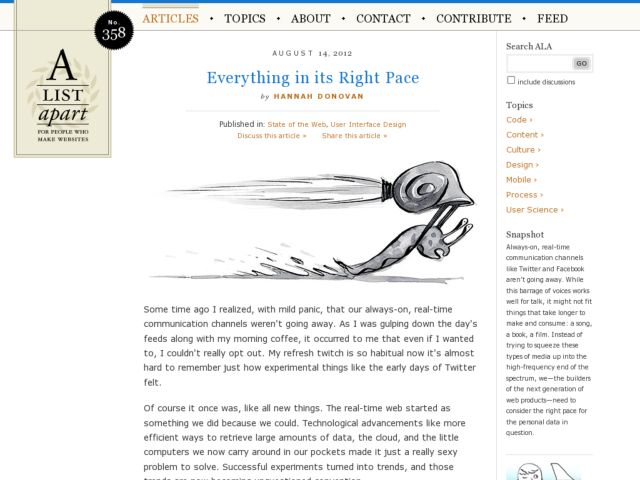Hannah Donovan's essay in A List Apart considers the issue of pace of delivery of information in web products. In a world where information is streamed constantly to us if we allow it, sometimes a slower pace, selective or scant data delivery, and better signal to noise is more appropriate and valuable. Context, medium, and place of use are important factors for determining delivery and pace.
I've been interested in the slow movement in recent years, as it relates to sustainable living, slow design, slow food, and the 1K Movement. In the summer of 2011, I was fortunate enough to experience a very special meal on a very small farm/restaurant in Italy's Le Marche region. All the food and drink prepared is grown on the farm or sourced hyper-locally, from meat and vegetables, to wine—everything within 1 kilometer. It was the most profound eating experience of my life. Little bits and pieces of that day have made me think about how my approach to work and life have become more and more connected to each other, and how much of an impact one's production and consumption decisions have on the world.
From a design and lifestyle perspective, I like to reference this summary of the philosophy of the Slow Movement by Professor Guttorm Fløistad, found on Wikipedia:
The only thing for certain is that everything changes. The rate of change increases. If you want to hang on you better speed up. That is the message of today. It could however be useful to remind everyone that our basic needs never change. The need to be seen and appreciated! It is the need to belong. The need for nearness and care, and for a little love! This is given only through slowness in human relations. In order to master changes, we have to recover slowness, reflection and togetherness. There we will find real renewal.
It's a bit touchy-feely, and lives entirely in the center of Maslow's Heirarchy of Needs. But the idea of taking a holistic approach to fulfilling needs in all things, provides the basis for actually satisfying them in other ways up the triangle. Specifically, I'm thinking of the idea of fulfilling the needs for esteem and self-actualization as one example. In a scenario where speed and volume has become the norm, how has that situation impacted our lives?
I like how Donovan tells the story of learning from the experience at Last.fm to imagine This is My Jam, a product that goes the other way, and focuses on the quality and value of the experience, using pace as the point of pivot. I like this approach. I have mostly stopped consuming from the firehose, and seek out the products that deliver a signal that I get more value from, more satisfaction, or that fulfill my basic needs with less fluff and noise. The decision to work with a product and team that follows those ideals is important to me as well.
Beth Meredith and Eric Storm summarize the concept of Slow Design.
Slow Design is a democratic and holistic design approach for creating appropriately tailored solutions for the long-term well being of people and the planet. To this end, Slow Design seeks out positive synergies between the elements in a system, celebrates diversity and regionalism, and cultivates meaningful relationships that add richness to life.
The Slow Movement is not just a lifestyle choice, but as designers, we can choose to have an impact on the world based on these ideals.
http://www.alistapart.com/articles/everything-in-its-right-pace/
